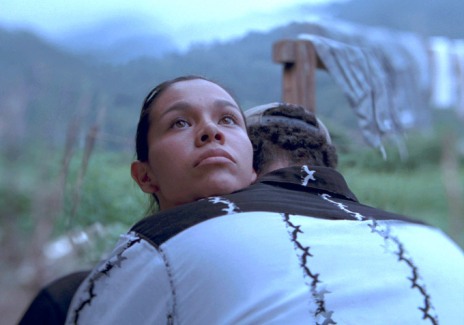The Latin phrase “Post Tenebras Lux” translates to “light, after darkness,” which to me implies something like “clarity and understanding, after obscurity.” But Carlos Reygadas’s (“Silent Light”) new film provides only murky ideas and feelings. It’s an arresting film of occasional beauty and horror, but most of it is lost in the clouds.
The movie has no story. It’s a dreamscape of emotions, fantasies and nightmares. The film is set in the rural mountainside and focuses on a wealthy family of four. Juan (Adolfo Jimenez Castro) and Natalia (Nathalia Acevedo) have two adorable toddlers, Rut and Eleazar. The young girl Rut is seen running through a muddy field before a thunderstorm chasing after dogs and cows. Eleazar is seen taking off his diaper and hurling it across the room, and in another scene wearing a Spiderman outfit and talking about Peter Parker.
These moments are beautiful, but they’re aimless. They exist out of time as though they are simply dreams or memories.
Contrast these with the more disturbing images. Juan and Natalia go to a bathhouse in France and participate in an orgy, but even this does not seem real, with dozens of naked bodies and faces simply sitting and staring through the haze of the room as disturbing noises penetrate our surroundings. In another scene, Juan scolds a whining dog and then beats it mercilessly by slamming its head into the patio floor.
For me the film represents the fleeting nature of time, our ever changing memories that blur moments and reflect back at our best and worst. The problem is that it’s very likely the film will mean something else to you. Reygadas gets distracted with momentary glimpses of kids in England playing rugby or an animated devil with a toolbox stealthily invading someone’s home. They’re surreal, supernatural plot devices that aim to elevate the ordinary but fail to focus on any concrete ideas.
And it’s all seen through a refracted, convex camera lens, blurring the frame’s edges and causing us to see double out in nature. It starts as a unique aesthetic, but you wonder why Reygadas couldn’t make the film look dreamlike without filtering it all through a kaleidoscope.
It reflects the broader difficulty of “Post Tenebras Lux,” a film that enchants in its distinctly skewed view of the world but ultimately clouds what we had hoped to see more clearly.
3 stars




